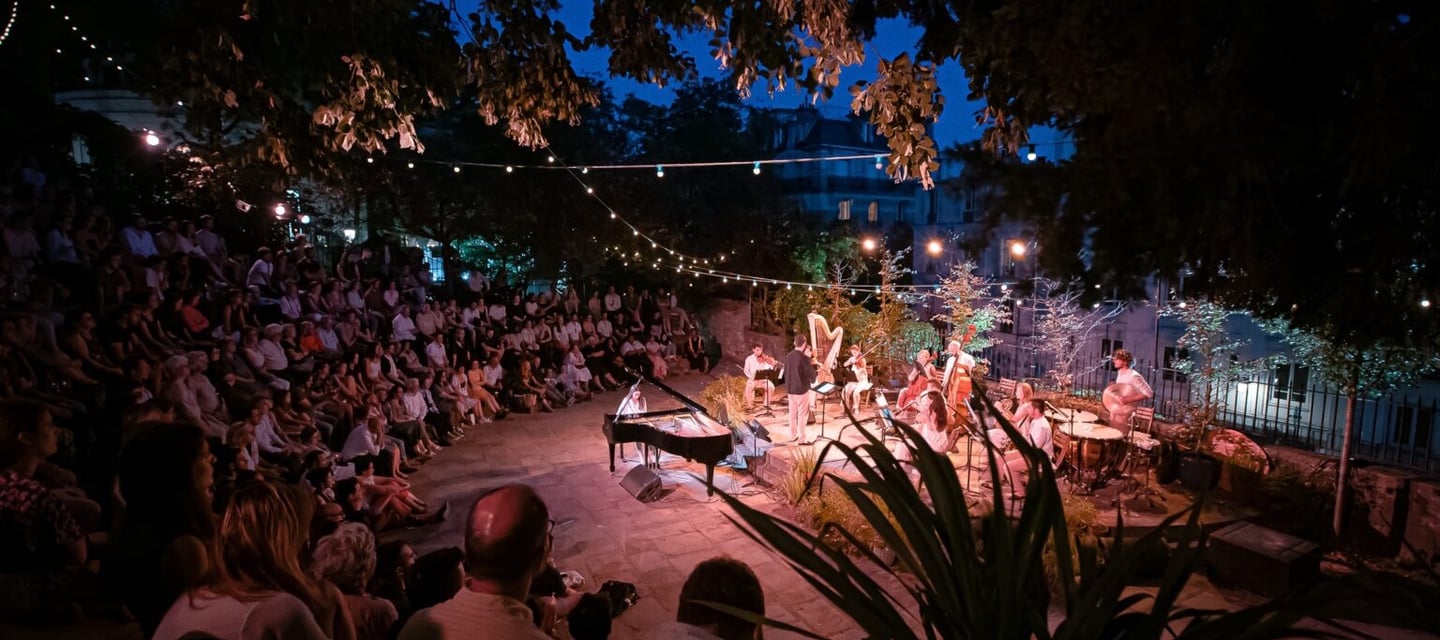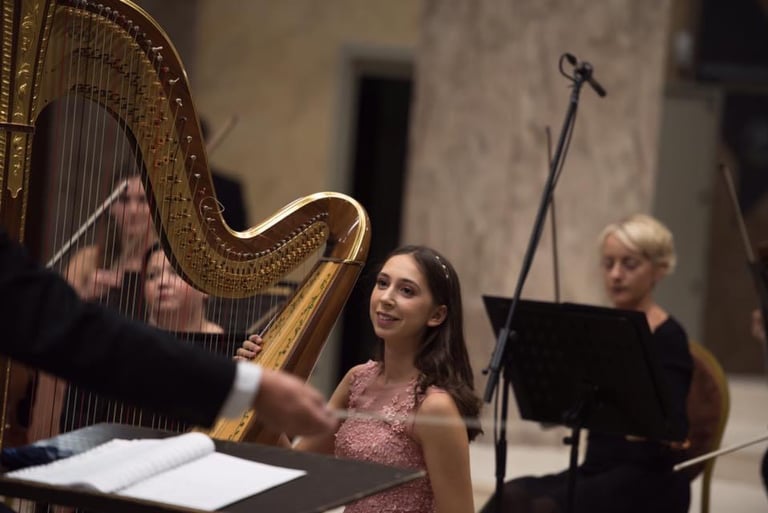Program proposal
" On the one hand, being in full search of music by Alexander Scriabin, my program is composed of great composers who want to connect several arts, such as poetry, philosophy, painting and share their inspirations with other artists. I am intrigued especially in the period of innovations, of the end of the XIX and beginning of the XX century.
On the other hand as a harpist and pianist, I am very inspired to connect his two instruments during my concerts, to make them dialogue and discover a repertoire that can link these two instruments with the transcription of the piano works on the harp and their original interpretations on the piano."
Solo recital piano
A. Scriabin (1872-1915),
Sonata op. 30 n° 4
Sonata op. 64 n°7
Sonata op. 66 n°8
I. Stravinsky (1882-1971), The Firebird, (transcribed by Guido Agosti)
Alexander Scriabin (1872-1915) is a famous composer known for his ten piano sonatas. According to composer Kurt Leland, some of these sonatas have a theosophical subtext, addressing esoteric and spiritual concepts. For example, the seventh sonata, entitled Messe Blanche, explores the mystical forces released during a magical ceremony. Scriabin was also fascinated by the experience of astral projection, which is reflected in his music and especially in sonata no. 4, which evokes the flight to a star. Another notable work is the Eighth Sonata, which uses five musical fragments to represent the permanent reality he wanted to express. Throughout his career, Scriabin has created unique and innovative compositions that continue to intrigue and fascinate listeners around the world. Igor Stravinsky’s Firebird will complete this program, and it is accompanied by a compelling story as well as philosophical thoughts. This work represents a tale danced in two tables, written from a tale, and the music was specially composed on the order of Serge Diaghilev. With enchanting melodies and catchy rhythms, L'Oiseau de Feu transports listeners into an imaginary world where magic and beauty reign supreme. These are excerpts from this work, transcribed for piano by the Italian pianist, Guido Agosti. This is an iconic piece that has made music history, and it promises to captivate audiences during this program.
F.Chopin (1810-1849), 24 preludes op.28
A. Scriabin (1872-1915), 24 preludes Op.11
The feelings of melancholy, desire, sadness and joy expressed by the twenty-four preludes op. 11 by Alexander Scriabin, appear as a great inspiration and admiration of the creation and especially the 24 preludes Op. 28 by Frédéric Chopin. So many similarities and differences of the same musical language combined by different cultures.
Scriabin (1872-1915), 24 preludes Op.11
F. Chopin (1810-1849), Ballade Op.52 n°4
K.Szymanowski (1882-1937), Variations op. 3
The creation of Frédéric Chopin represents a great inspiration of various composers. A.Scriabine with twenty-four preludes op. 11 of Alexander Scriabin, appear as a great inspiration and admiration of the creation of Frédéric Chopin.Three souls meet with romantic music. The Scriabin preludes and Variations by the Polish composer, Karol Szymanowski, echo the fourth Ballad of Frédéric Chopin, one of his most monumental works, which best represents his style and language.
F.Chopin (1810-1849), Sonata Op.58 n° 3
Fantaisie-Impomptu Op.66
Scherzo Op.39 n°3
Ballade Op.52 n°4
The program around the Polish composer, Frédéric Chopin, who enriches the piano repertoire with great works that express a colorful romanticism by harmonies that mix with expressive melodies.
J.Ph.Rameau (1683-1764): Gavotte et six doubles
L.van Beethoven (1770-1827): Sonata Op.2 n°2
A.Scriabine(1872-1915): Etude Op.42 n°5
G.Ligeti (1923-2006): Etude n°8
F.Chopin (1810-1849): Etude Op.10 n°4, n°5
F.Liszt (1811-1886): Etude de concert S.144, n°2 "La Leggerezza"
Tarantella S.162
The musical journey through the composers of the baroque to the XXI century. Program that surrounds the great composers and contains very contrasting and virtuoso works.
Solo recital, harp
A.F. Marescotti (1902-1995): Mouvement
J.M. Damase (1928-2013): Sicilienne variée
M. de Falla (1876-1946) La vida breve (excerpt), Spanish dance n°1 (trans. M. Grandjany)
A. Caplet (1878-1925): Deux divertissements | 1924
À la française
À l’espagnole
S. Natra (1924 - 2021): Ode to the Harp
F. Liszt (1811-1886): « Un Sospiro » (trans. H. Renié)
A dream over time
A journey through time, a journey through space; from Franz Liszt to Sergiu Natra, you will hear the European continent resonate under the strings of the harp. Invented by Sébastien Erard in the 19th century, the famous double-movement fork system with seven pedals offers completely new possibilities. An opportunity for composers and performers to explore techniques and harmonies previously unattainable. The invention gave birth to the technique of pedal glissando – used with finesse in André Caplet’s Divertissement à l'espagnole – and a whole host of impressionist pieces from the French school (including Jean-Michel Damase’s Sicilienne variée). Transcriptions flourish and the harp repertoire is gradually enriched, Un Sospiro by Liszt and the famous Spanish dance of La vida breve by De Falla are revealed under another face.
W.A.Mozart (1756-1791), Sonata K331 (trans. N.Dornik)
F. Liszt (1811-1886), « Un Sospiro » (trans. H. Renié)
F.Chopin (1810-1849), Fantaisie-Impromptu Op. 66 (trans. N.Dornik)
C.Salzedo (1885-1961), Variations sur un thème dans le style ancien, Op.30
H.Renié (1875-1956), Légende
Solo recital, harp and piano
Harp:
C.Debussy (1862-1918), Suite Bergamasque - Prélude, Menuet, Clair de Lune
F. Liszt (1811-1886), « Un Sospiro » (trans. H. Renié)
F.Chopin (1810-1849), Fantaisie-Impromptu Op. 66 (trans. N.Dornik)
Piano:
C.Debussy (1862-1918), Prélude N°4 du livre 1: « les sons et les parfums tournent dans l’air du soir »
Prélude N°7 du livre 1: « ce qu’a vu le vent d’ouest »
F.Chopin (1810-1849), Ballade Op. 52 N°4
F.Liszt (1811-1886), Venezia e Napoli S.162 - Tarantella
Concertos
Harp:
G.F.Haendel (1685-1759), Concerto Op.4 n°6 HWV 294
F.A.Boieldieu (1775-1834), Harp Concerto
C.Debussy (1862-1918), Danses sacrée et profane
G.Pierné (1863-1937), Concertstück
R.Glière (1875-1956), Harp Concerto Op.74
A.Ginastera (1916-1983), Harp Concerto Op.25
Piano:
W.A.Mozart(1756-1791), Concerto K450 n° 15
Concerto K466 n°20
Concerto K488 n°23
L.van Beethoven (1770-1827), Concerto no. 3 Op.37,
Concerto no.4 op.58
F.Chopin (1810-1849), Concerto Op.21 n° 2
C.Saint-Saëns (1835-1921), Concerto Op.22 n°2
R.Schumann (1810-1856), Concerto pour piano Op.54
F.Liszt (1811-1886), Concerto No. 1
M.Ravel (1875-1937), Concerto en Sol Majeur
A. Scriabine (1872-1915), Promethée - Le poème du Feu, Op. 60 pour piano et orchestre
Concerto pour piano et orchestre Op.20
I. Stravinski (1882-1971), Concerto pour piano et orchestre
S.Rachmaninoff (1873-1943), Concerto n°2 pour piano et orchestre
Concerto n°3 pour piano et orchestre
The Rhapsody on a Theme by Paganini Op. 43




